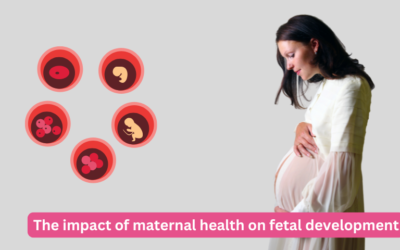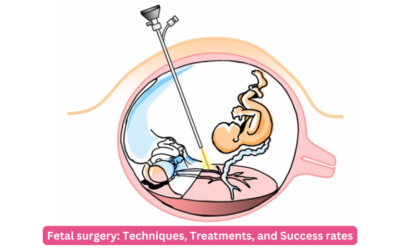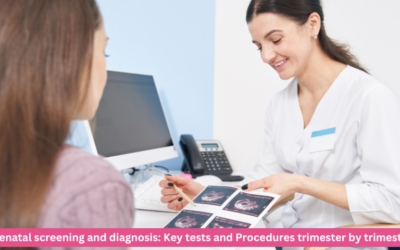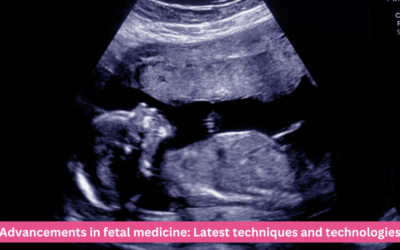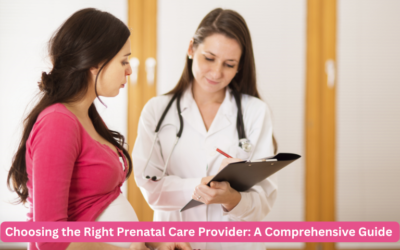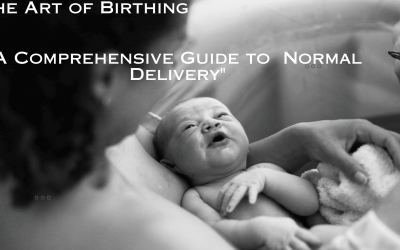Pregnancy is an exciting journey, but it can also bring a lot of questions and concerns for expecting parents. One important aspect of prenatal care is routine testing, which helps ensure the health and well-being of both mother and baby. In this blog, we’ll walk through the different types of routine prenatal tests, why they’re essential, and what to expect at each stage.
1. Initial prenatal visit tests
During your first prenatal visit, your healthcare provider will order several baseline tests to understand your health status and identify any potential risks. Here are the common tests done at this stage:
- Complete blood count (CBC): This test measures levels of red and white blood cells, hemoglobin, and platelets. It helps detect anemia or infections that may need monitoring.
- Blood type and Rh factor: Determining your blood type and Rh factor is crucial to address any Rh incompatibility issues, which can impact pregnancy.
- Urine analysis: A urine test screens for protein, glucose, and signs of infection. Urinary tract infections (UTIs) are common in pregnancy and need prompt treatment to avoid complications.
- Infectious disease screening: Blood tests are done to check for infections such as HIV, hepatitis B, syphilis, and rubella immunity. This ensures early intervention if necessary.
2. First-trimester screening
The first trimester is a critical period of development for your baby. During this time, doctors may recommend additional screenings:
- Nuchal Translucency (NT) scan: Performed between 11 and 14 weeks, this ultrasound measures the thickness of fluid at the back of the baby’s neck. It helps identify potential chromosomal abnormalities.
- Blood screening tests (PAPP-A and hCG): These blood tests called Double Marker Test measure proteins and hormones associated with the baby’s development. Abnormal levels may indicate risks for genetic conditions.
- Non-Invasive Prenatal Testing (NIPT): NIPT is an optional blood test that screens for genetic conditions like Down syndrome. It’s highly accurate and can be done as early as the 10th week and with High sensitivity.
3. Second-trimester screening
In the second trimester, there are a few more tests to check the baby’s growth and development:
- Quad screen: This blood test, usually performed between 15 and 20 weeks, measures four substances in your blood (AFP, hCG, estriol, and inhibin-A) to assess the risk of chromosomal abnormalities or neural tube defects.
- Anatomy ultrasound: At around 18-22 weeks, an anatomy scan is conducted to check the baby’s organs, limbs, spine, and overall growth. This is often a detailed scan that allows parents a closer look at their baby.
- Glucose screening test: Typically done around the 24th to 28th week, this test screens for gestational diabetes. You’ll drink a sugary solution, and your blood glucose levels will be checked after an hour.
4. Third-trimester testing
As the due date approaches, routine tests focus on ensuring the baby’s readiness for birth and the mother’s health during labor:
- Group B Streptococcus (GBS) test: This is a common test done between 35 and 37 weeks. GBS bacteria can be present in the birth canal and may pose a risk to the baby during delivery. If positive, antibiotics are given during labor.
- Non-Stress Test (NST): An NST monitors the baby’s heart rate and movement in response to contractions or stimuli. It is commonly done if there are concerns about the baby’s growth or activity levels.
- Biophysical Profile (BPP): This combines an NST with an ultrasound to evaluate the baby’s movement, breathing, muscle tone, and amniotic fluid levels. A BPP may be recommended for high-risk pregnancies or if the baby’s movements are reduced.
5. Optional or Additional tests
In some cases, your healthcare provider may suggest other tests based on your health, family history, or specific pregnancy conditions:
- Amniocentesis: A test done usually after the 15th week, where a small amount of amniotic fluid is taken to check for genetic conditions or neural tube defects.
- Chorionic Villus Sampling (CVS): Performed between 10 and 13 weeks, CVS is used to detect genetic abnormalities. It’s an option if the first-trimester screening shows a high risk for genetic disorders.
- Doppler ultrasound: This test measures blood flow in the umbilical cord, placenta, and baby’s blood vessels. It’s often recommended if the baby’s growth appears restricted.
6. Understanding your test results

Each test result can provide different insights into your baby’s health and development, but it’s important to remember that many of these screenings assess the risk, not a diagnosis. Your healthcare provider will interpret the results and discuss any additional steps if necessary. Don’t hesitate to ask questions and seek clarification to feel more comfortable and informed.
7. Common concerns about prenatal tests
- Are all these tests necessary? Not all tests are required; some are based on individual risk factors or personal preferences. Talk with your doctor to decide which tests are best for you and your baby.
- Are these tests safe? Most routine prenatal tests are non-invasive and safe for both mother and baby. Invasive tests, like amniocentesis or CVS, carry slight risks, and your doctor will discuss these thoroughly before proceeding.
Conclusion
Routine prenatal tests are an essential part of pregnancy care, helping to track the health of both mother and baby at every stage. At Shukan Hospital & IVF Centre, we’re here to ensure you receive the best care and feel confident throughout your pregnancy journey. Contact us today to learn more about our prenatal care services, or schedule a consultation with our experienced team to discuss your needs and answer any questions. We’re here every step of the way.
Author bio
Dr. Hardik Savaliya
He is a highly dedicated and empathetic gynecologist and infertility specialist who has been serving patients with utmost care and professionalism for over 5 years. His approach to patient care is holistic, ensuring that each woman receives not just medical treatment, but also emotional support throughout her journey. His primary focus is on empowering women with knowledge about their health and providing them with the best possible solutions tailored to their individual needs.
Having completed his MBBS and DGO, he possesses in-depth knowledge and expertise in the field of gynecology and obstetrics. He is well-versed in the latest advancements in infertility treatments and gynecological care, including IVF, IUI, and other assisted reproductive technologies. His success in treating couples with infertility issues is a testament to his skill and dedication.
He is also recognized for his competence in managing high-risk pregnancies, ensuring the safety and well-being of both the mother and the baby. His surgical expertise, particularly in minimally invasive procedures, allows him to offer effective solutions with quicker recovery times.
Throughout his career, he has been committed to continuous learning and professional development. This dedication is reflected in his various certifications and memberships with prestigious organizations like FOGSI. Patients appreciate his approachable nature, detailed consultations, and the personalized care plans he offers, which make them feel at ease during what can often be a stressful time.
At Shukan Hospital & IVF Centre, He is known not just for his clinical expertise but also for his compassionate bedside manner, making him a trusted and respected figure in the field of gynecology and infertility.
FAQs
What is the difference between a screening test and a diagnostic test during pregnancy?
Screening tests estimate the risk of certain conditions in the baby, while diagnostic tests provide a definitive diagnosis. Screening tests are typically non-invasive, while diagnostic tests like amniocentesis and CVS are more invasive.
Are there any dietary or lifestyle preparations I should make before prenatal testing?
For some tests, such as the glucose screening test, you may need to follow specific dietary guidelines beforehand. Your healthcare provider will inform you of any special preparations.
How often will I need to undergo prenatal tests throughout my pregnancy?
The frequency of tests depends on your health, the pregnancy stage, and any specific needs. Routine tests are conducted in each trimester, but your doctor may recommend additional testing based on risk factors.
What happens if I miss a scheduled prenatal test?
Missing a test can delay important information about your health or the baby’s health. Contact your healthcare provider to reschedule as soon as possible and discuss any potential implications.
Can prenatal tests detect any heart issues in the baby?
Yes, certain tests like the anatomy ultrasound and specialized fetal echocardiograms (if needed) can identify structural heart issues. These tests are often recommended if there’s a family history of heart conditions.
What are the most common follow-up tests if an abnormal result is found?
Follow-up tests depend on the abnormal result but may include additional ultrasounds, more detailed blood tests, or diagnostic procedures like amniocentesis or CVS.
Blogs related to Maternity
Fetal Growth Monitoring: Why it’s crucial during pregnancy?
Pregnancy is a journey of immense joy and responsibility, where the health and growth of your unborn baby become a top priority. Among the many...
Understanding HCG levels in pregnancy
Human Chorionic Gonadotropin (HCG) is a key hormone that plays a vital role in early pregnancy. Often called the "pregnancy hormone," HCG is...
Anemia and Pregnancy – What every woman should know?
Pregnancy is a life-altering experience, full of joy and excitement, but also filled with challenges and adjustments. Among the various health...
How does your body change during pregnancy?
Pregnancy is one of the most profound experiences a woman can go through, both physically and emotionally. As your body prepares to bring a new life...
How to deal with white discharge during pregnancy?
During pregnancy, the body undergoes many changes, some of which can be surprising or even concerning if you're not familiar with them. One common...
The impact of maternal health on fetal development
Maternal health plays a crucial role in ensuring a healthy pregnancy and optimal fetal development. From the moment of conception, the health of the...
Understanding the fetal anatomy scan: What to look for?
Pregnancy is an incredible journey filled with milestones that ensure the health and well-being of both the mother and baby. One such important...
Ectopic pregnancy: Symptoms, Causes & Treatments
Ectopic pregnancy is a rare but serious condition in which a fertilized egg implants outside the uterus, most commonly in one of the fallopian...
The ethics of fetal medicine: Navigating complex decisions
Fetal medicine is a rapidly evolving field that combines advancements in technology, medical knowledge, and ethical considerations. As we strive to...
IVF and Multiple pregnancies: Understanding the risks and Benefits
In vitro fertilization (IVF) has brought hope to countless couples seeking to build families. However, one of the more complex aspects of IVF is the...
Fetal medicine and Birth planning: A professional guide to preparing for delivery
Fetal medicine plays a crucial role in modern obstetrics, offering invaluable insights into the health and development of the fetus. It enables...
Fetal surgery: Techniques, Treatments, and Success rates
Fetal surgery is a revolutionary field in medicine that addresses birth defects and other conditions while a baby is still in the womb. With...
Prenatal screening and diagnosis: Key tests and Procedures trimester by trimester
Prenatal screening and diagnostic tests are essential for monitoring the health of both the mother and baby during pregnancy. These tests help...
Advancements in fetal medicine: Latest techniques and technologies
The field of fetal medicine has experienced incredible advancements in recent years, offering pregnant women and their unborn babies more precise...
Difference between 3D and 4D sonography: Which one is right for you?
Sonography has become an integral part of prenatal care, helping expectant parents and doctors monitor the development of the fetus in real time....
15 foods and drinks to eat & avoid during pregnancy
Pregnancy is a special time that calls for extra attention to your diet. What you eat not only affects your health but also the development of your...
Understanding pregnancy trimesters: What to expect in each stage
Pregnancy is a remarkable journey, divided into three trimesters, each bringing its own set of changes, challenges, and milestones. At Shukan...
Preparing for Pregnancy: Essentials steps to take
At Shukan Hospital and IVF Center, we understand that preparing for pregnancy is an exciting and significant journey. Taking the right steps before...
Postpartum Recovery: What to Expect and How to Heal
The postpartum period, often referred to as the fourth trimester, is a significant phase of recovery and adjustment for new mothers. At Shukan...
Introduction to Fetal Medicine: What You Need to Know
At Shukan Hospital and IVF Center, we are dedicated to providing comprehensive care for expectant mothers and their babies. Fetal medicine is a...
Diagnostic Ultrasound in Fetal Medicine: Types and Uses
Diagnostic ultrasound is a cornerstone of fetal medicine, providing detailed insights into the health and development of the fetus during pregnancy....
Navigating the First Trimester: What to Expect
The first trimester of pregnancy is an exciting and transformative period, filled with anticipation and many changes. This phase, spanning from...
Managing Pregnancy Discomforts: Tips for Relief
Pregnancy is a beautiful journey that brings immense joy, but it also comes with its share of physical and emotional challenges. At Shukan Hospital...
Creating a Birth Plan: Your Guide to Personalized Care
Creating a birth plan is an empowering step in your pregnancy journey, allowing you to outline your preferences and make informed decisions about...
Common Pregnancy Myths: Debunking Misconceptions
We know that pregnancy is an exciting and emotional journey. With all the advice and stories you hear from friends, family, and even strangers, it...
Choosing the Right Prenatal Care Provider: A Comprehensive Guide
Choosing the right prenatal care provider is a critical decision that significantly impacts your pregnancy journey and the health of both you and...
The Art of Birthing: A Comprehensive Guide to Normal Delivery
Introduction Welcome to Shukan Hospital and IVF Center comprehensive guide to embracing natural childbirth. Welcoming a new life into the world...
Navigating Pregnancy Milestones: A Week-by-Week Guide
Introduction:Embarking on the miraculous journey of pregnancy is a momentous experience, and Shukan Hospital and IVF Centre proudly stands as your...
Unlocking the Power of Maternal Mental Health: A Path to Positive Pregnancy Outcomes
IntroductionMental health during pregnancy is a topic gaining significant attention in recent years. It's not just about the physical aspects of...
The Importance of Early Pregnancy Scans: Ensuring a Healthy Journey
Pregnancy is a uniquely special time, filled with excitement and joy.The wonder of early pregnancy is often accompanied by new feelings, new...
Fertility specialist or Gynecologist? Which is right for you?
When you are trying to conceive, it is understandable to wonder when and which doctor to consult. Patient confusion tends to originate from the fact...







